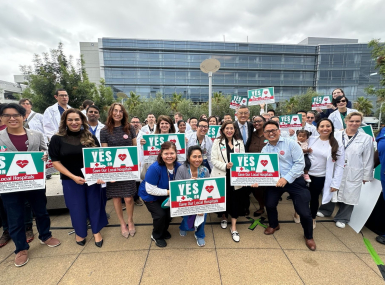Recent federal action advances key maternal health policies
Author

Blaire Bryant
Upcoming Events
Related News

Key Takeaways
On December 23, 2022, Congress passed the Fiscal Year (FY) 2023 omnibus appropriations bill, which included a provision that would permanently grant states the option to provide 12 months of Medicaid coverage for postpartum women and children – a key win for counties. The provision was originally included as a time-limited provision in the American Rescue Plan Act of 2021 (ARPA/P.L. 117-2), and is aimed at reducing maternal death by providing access to life-saving health care coverage a full year after birth.
This policy change is one of several key policy measures aimed at mitigating the worsening maternal health crisis across the United States. In 2020, over 800 women died due to pregnancy or childbirth related complications, of which at least 80 percent of deaths were preventable, according to the Centers for Disease Control and Prevention (CDC). Data on maternal mortality also points to significant racial and ethnic disparities, suggesting that black and indigenous birth people die at 2-3 times the rate of their white counterparts. And while rates of maternal death were at an all-time high in 2020, access to maternity care declined, with more than half of rural counties lacking hospitals with labor and birthing services and the number of counties considered to be maternity care deserts growing above 1,100.
Bill Title | Summary | Date Signed into Law |
|---|---|---|
Data Mapping to Save Moms’ Lives Act (P.L. 117-247) | Requires the Federal Communications Commission (FCC) to identify areas where high rates of poor maternal health outcomes overlap with lack of access to broadband services in order to pinpoint where telehealth services can be most effective | 12/20/2022 |
Maternal Health Quality Improvement Act of 2021 | Amends the Public Health Services Act to improve maternal health and obstetric care in rural areas | March 9, 2022 (Passed with the FY 2022 Omnibus Appropriations) |
Rural Maternal and Obstetric Modernization of Services (MOMS) Act | Improves rural maternal and obstetric care data, awards new rural obstetric network grants, expands existing federal telehealth grant programs, and establishes a new rural maternal and obstetric care training demonstration | March 9, 2022 (Passed with the FY 2022 Omnibus Appropriations) |
Protecting Moms Who Served Act of 2021 (P.L. 117-69) | Codifies the Department of Veterans Affairs current maternity care coordination program |
11/30/21 |
In addition to congressional action, the White House has indicated their commitment to close disparities in maternal care and outcomes for all birthing people by addressing systemic issues contributing to racial inequities in maternal death.
White House
Following the inaugural White House Maternal Health Day of Action and Maternal Health Summit in December 2021, the Maternal Health Blueprint was released in June of 2022, with 5 key objectives:
- To increase access to and coverage of comprehensive high quality maternal health services, including behavioral health
- Ensure those giving birth are heard and are decision-makers in accountable systems of care
- Advance data collection, standardization, transparency, research and analysis
- Expand and diversify the perinatal workforce
- Strengthen economic and social supports for people before, during and after pregnancy
U.S. Department of Health and Human Services
The Assistant Secretary for Planning and Evaluation (ASPE) released a report in December 2022, entitled “Doula Care and Maternal Health: An Evidence Review”, which provides an overview of the impact of doula care on maternal health outcomes and the role of Medicaid in increasing the uptake of doula care. The report highlighted the positive impact that doulas- trained professionals who provide physical, emotional, and informational support to pregnant and postpartum individuals- have on maternal and health outcomes before, during and after labor.
Additional progress by the Administration has been made through the Centers for Medicare & Medicaid Services (CMS). The agency released their Maternity Care Action Plan to implement the Administration’s blueprint in July 2022. Additionally, prior to that, CMS has also approved multiple Medicaid Section 1115 waivers to extend postpartum coverage. As of December 2022, 36 states and D.C. have taken steps to implement the 12-month extension for Medicaid postpartum coverage.
Another key step made by CMS is the plan to establish a “Birth-Friendly Hospital” designation to help better describe the quality of maternal health services for the nation’s hospitals. It was announced that more than 25 health plans have committed to displaying the “Birthing-Friendly Hospital” designation next fall when the program goes live. The designation was established through a final rule from CMS last month, which provided national quality standards for maternal care in hospitals across the U.S.
As owners and administrators of the local health and human services social net, counties play a critical role in improving the health of pregnant and postpartum individuals. Counties applaud efforts at the congressional and administrative level to advance maternity care through the Medicaid program, which is operated through an intergovernmental partnership between states, counties and the federal government. NACo will continue to champion administrative efforts and the passage of bipartisan legislation in the 118th Congress that will assist counties in improving maternal health outcomes.
Webinar
Breaking Down Silos to Address Maternal and Infant Mortality: Lessons from the Local Level
Join NACo for a briefing focused on innovative county solutions to address disproportionate Black maternal and infant mortality rates

Related News

CMS issues new guidance on Medicaid Community Engagement Requirements
On December 8, the Centers for Medicare & Medicaid Services (CMS) released a Medicaid and CHIP Services Informational Bulletin (CIB) directing states on how to implement the Medicaid community engagement requirements enacted under Section 71119 of the One Big Beautiful Bill Act legislation (Public Law 119-21), or H.R. 1.

California county sales tax measure backfills federal healthcare cuts
Santa Clara County, Calif. will raise an estimated $330 million each year from a sales tax to backfill lose Medicaid funding.
